Talks with Jan
 |
 |
 |
 |
 |
 |
 |
The Death of King George V:
A Stimulus for Euthanasia?
Point de Vue, the prestigious French weekly focused on royalty and nobility, dropped a small bomb with a recent article titled “George V – Was He Euthanized?” The author then responds that he certainly was, according to the diary of his doctor, Viscount Lord Bertrand Dawson of Penn.
“Did you know this?” my friend Jan asked.
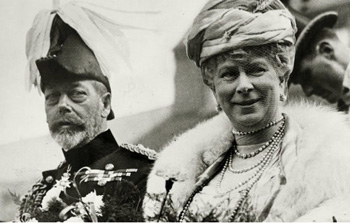
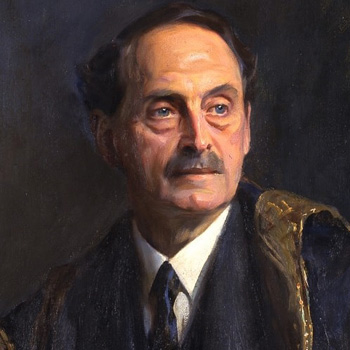 No, I did not, although I discovered that the news had been made public in 1986. The euthanasia is even recorded as fact in
Britannica Encyclopedia.
No, I did not, although I discovered that the news had been made public in 1986. The euthanasia is even recorded as fact in
Britannica Encyclopedia.
The King’s health had declined for several months due to a chronic lung issue, and he had been bedridden in Sandringham House for five days. The decline continued and the Monarch was slipping in and out of consciousness. During moments of lucidity, he inquired “on the state of the Empire” and other matters.
The decline continued, but death evaded the British King. Point de Vue reports that his wife Queen Mary and their eldest son, the future King Edward VIII, had privately told Dawson earlier that day "to do the right thing" and not unnecessarily prolong the life of the King.
At 9:30 p.m. Dawson noted in his health report that “the life of the King is progressing peacefully towards its end.” More hours passed, and the King did not die. So, Dawson, a Freemason, did what he thought “right.”
The royal physician made this decision that he later recorded in his diary: “At about 11 o'clock it was evident that the last stage might endure for many hours, unknown to the Patient, but little comporting with that dignity and serenity which he so richly merited and which demanded a brief final scene.
“Hours of waiting just for the mechanical end, when all that is really life has departed, only exhausts the onlookers & keeps them so strained that they cannot avail themselves of the solace of thought, communion or prayer.
“I therefore decided to determine the end and injected (myself) morphia gr. 3/4 and shortly afterwards cocaine gr. 1 into the [King’s] distended jugular vein.”
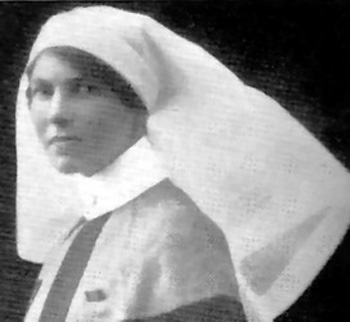 The last words of the King, who was apparently conscious enough to speak and perhaps realize what was happening, were “Be damned” to the nurse who administered the sedative prior to the doctor’s injections.
The last words of the King, who was apparently conscious enough to speak and perhaps realize what was happening, were “Be damned” to the nurse who administered the sedative prior to the doctor’s injections.
Dawson’s dose of morphine and cocaine resulted in the King’s death, an act of “euthanasia,” or medically assisted suicide, or, plainly said, murder, which was illegal then and now in Great Britain and prosecutable as murder or manslaughter.
According to Dawson’s journal entry, he had two intentions:
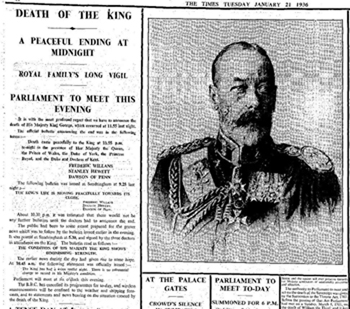 Instead of facing prosecution for
murder, Dawson was advanced in the peerage as Baron Dawson of Penn and became an active member of the House of Lords, among other honors generously bestowed on him. He remained in the medical households of King Edward VIII and his brother King George VI.
Instead of facing prosecution for
murder, Dawson was advanced in the peerage as Baron Dawson of Penn and became an active member of the House of Lords, among other honors generously bestowed on him. He remained in the medical households of King Edward VIII and his brother King George VI.
The diary entry was discovered by Dawson’s biographer, Francis Watson, in 1950. At the request of his widow, Lady Dawson, he agreed not publish them in his work since “the matter is still too sensitive.” Only in 1986 did Watson decide the climate had changed enough that he could reveal the whole truth in an article for History Today.
A push for euthanasia
“Why do you think they are re-printing this story now?” My friend Jan asked. “Do you think it is to encourage the laws for euthanasia and assisted suicide that are being passed today?”
It could well be one of the reasons. Euthanasia or assisted suicide is legal in seven Western countries and 10 U.S. states. And even though still officially illegal in England and Wales, unofficially, it is not uncommon for a patient’s death to be hastened and for there to be no legal ramifications attached to the physician that caused the death.
In December 2018, the British Medical Association (BMA) and the Royal College of Physicians jointly published guidance on when doctors are permitted to allow patients to die. The chair of the BMA’s ethics committee John Chisholm said: "The aim of medical treatment is not simply to prolong life at all costs."
One can see that since at least 1936 – when Dawson murdered King George – the practice of doctor’s hastening patients’ deaths was something acceptable in certain revolutionary higher circles. Ten months after his death, Lord Dawson spoke on euthanasia in the House of Lords where he described it as a “mission of mercy.” However, he opposed a move in the House of Lords to legalize it because such decisions, in his view, "belong to the wisdom and conscience of the medical profession and not to the realm of law."
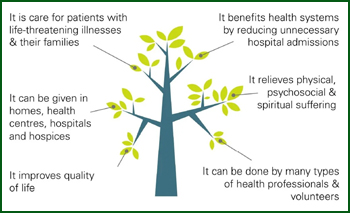 In a New York Times article published in 1986, he stated: “One should make the act of dying more gentle and more peaceful even if it does involve curtailment of the length of life. That has become increasingly the custom. This may be taken as something accepted.”
In a New York Times article published in 1986, he stated: “One should make the act of dying more gentle and more peaceful even if it does involve curtailment of the length of life. That has become increasingly the custom. This may be taken as something accepted.”
For the common Englishman to accept such a crime in 1936 would have been hard to swallow, even unthinkable. That is why the crime was hushed.
Today, those moral barriers have dropped and euthanasia is debated openly everywhere with increasingly more pros than cons to make the “process” legal. So, re-publishing the story of George V’s death by euthanasia – a death decided by the family, it seems, and not himself in view of his last words – will hardly raise an eyebrow in shock.
What was too shocking to reveal back in the 1930s and ‘40s today is news that surprises but does not shock. Rather it provides a royal example that supports the pro-euthanasia forces and bolsters support for the WHO goals for palliative care, the latest euphemism for murder and/or suicide.
“The doctor was good to relieve his suffering.” “The family made the right decision.” These are comments we are likely to hear today on the re-reporting of the death of King George V.
For Jan and me, the murder of George V is shocking. We are saddened that the King, because of the heresy of his ancestors, did not have the opportunity to confess his sins and receive Extreme Unction. Instead, in the words of Dr. Dawson, who believed that “all that is really life has departed,” his end was nigh and there was no need to prolong the suffering any longer.
We are grieved that his family were not together at the bedside imploring Heaven for his good death and urging him to offer his sufferings for the salvation of his soul. Instead, again returning to the excuse of Dawson, who notes that waiting at a slow death “only exhausts the onlookers” and keeps them so strained they cannot “think, be in communion or pray,” the King died alone, his wife having returned to London, the others perhaps too embarrassed to witness the heinous deed.
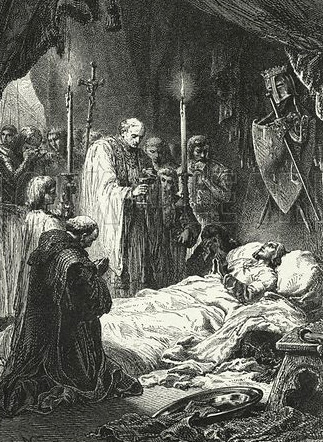 We wish that his last words were a holy ejaculation or pious prayer. Rather, there was that ominous “Be damned!” mumbled to
his private nurse who administered the last medication.
We wish that his last words were a holy ejaculation or pious prayer. Rather, there was that ominous “Be damned!” mumbled to
his private nurse who administered the last medication.
Jan and I as Catholics believe that murder – be it a violent strangling, an abortion or euthanasia is exactly that, murder, a mortal sin against the 5th commandment, a crime against God and society. Instead, lacking the belief that an unconfessed mortal sin that damns the soul to Hell, readers of the King's death will praise, not condemn, the doctor and family's action.
For the majority of Catholics in whom the light of Faith has dimmed if not been extinguished, the murder will also be considered a merciful act, a “decision” that should depend not on Morals and the Decalogue but left to the conscience of the person and his family.
In my view, today’s general indifference toward the murder of George V is another consequence of Vatican II: When the Church, the real fulcrum of morality for the world, relaxed her strict morals and doctrine and opened her doors to the modern world, every evil and atrocity entered not only her doors, but all of society.

“Did you know this?” my friend Jan asked.

Queen Mary instructed the King’s doctor ‘to do the right thing’ to relieve her husband of pain

Lord Bertrand Dawson of Penn, the King’s doctor
The King’s health had declined for several months due to a chronic lung issue, and he had been bedridden in Sandringham House for five days. The decline continued and the Monarch was slipping in and out of consciousness. During moments of lucidity, he inquired “on the state of the Empire” and other matters.
The decline continued, but death evaded the British King. Point de Vue reports that his wife Queen Mary and their eldest son, the future King Edward VIII, had privately told Dawson earlier that day "to do the right thing" and not unnecessarily prolong the life of the King.
At 9:30 p.m. Dawson noted in his health report that “the life of the King is progressing peacefully towards its end.” More hours passed, and the King did not die. So, Dawson, a Freemason, did what he thought “right.”
The royal physician made this decision that he later recorded in his diary: “At about 11 o'clock it was evident that the last stage might endure for many hours, unknown to the Patient, but little comporting with that dignity and serenity which he so richly merited and which demanded a brief final scene.
“Hours of waiting just for the mechanical end, when all that is really life has departed, only exhausts the onlookers & keeps them so strained that they cannot avail themselves of the solace of thought, communion or prayer.
“I therefore decided to determine the end and injected (myself) morphia gr. 3/4 and shortly afterwards cocaine gr. 1 into the [King’s] distended jugular vein.”

Catherine Black, the King’s private nurse. His final words ‘Be damned’ were addressed to her
Dawson’s dose of morphine and cocaine resulted in the King’s death, an act of “euthanasia,” or medically assisted suicide, or, plainly said, murder, which was illegal then and now in Great Britain and prosecutable as murder or manslaughter.
According to Dawson’s journal entry, he had two intentions:
- To grant the King a painless death, and
- To guarantee that his passing would be announced in the prestigious morning papers rather than the “less appropriate evening journals.”

The death of the King was announced in the morning Times, as duly planned
The diary entry was discovered by Dawson’s biographer, Francis Watson, in 1950. At the request of his widow, Lady Dawson, he agreed not publish them in his work since “the matter is still too sensitive.” Only in 1986 did Watson decide the climate had changed enough that he could reveal the whole truth in an article for History Today.
A push for euthanasia
“Why do you think they are re-printing this story now?” My friend Jan asked. “Do you think it is to encourage the laws for euthanasia and assisted suicide that are being passed today?”
It could well be one of the reasons. Euthanasia or assisted suicide is legal in seven Western countries and 10 U.S. states. And even though still officially illegal in England and Wales, unofficially, it is not uncommon for a patient’s death to be hastened and for there to be no legal ramifications attached to the physician that caused the death.
In December 2018, the British Medical Association (BMA) and the Royal College of Physicians jointly published guidance on when doctors are permitted to allow patients to die. The chair of the BMA’s ethics committee John Chisholm said: "The aim of medical treatment is not simply to prolong life at all costs."
One can see that since at least 1936 – when Dawson murdered King George – the practice of doctor’s hastening patients’ deaths was something acceptable in certain revolutionary higher circles. Ten months after his death, Lord Dawson spoke on euthanasia in the House of Lords where he described it as a “mission of mercy.” However, he opposed a move in the House of Lords to legalize it because such decisions, in his view, "belong to the wisdom and conscience of the medical profession and not to the realm of law."

WHO propaganda pushing palliative care as
‘the right thing to do’
For the common Englishman to accept such a crime in 1936 would have been hard to swallow, even unthinkable. That is why the crime was hushed.
Today, those moral barriers have dropped and euthanasia is debated openly everywhere with increasingly more pros than cons to make the “process” legal. So, re-publishing the story of George V’s death by euthanasia – a death decided by the family, it seems, and not himself in view of his last words – will hardly raise an eyebrow in shock.
What was too shocking to reveal back in the 1930s and ‘40s today is news that surprises but does not shock. Rather it provides a royal example that supports the pro-euthanasia forces and bolsters support for the WHO goals for palliative care, the latest euphemism for murder and/or suicide.
“The doctor was good to relieve his suffering.” “The family made the right decision.” These are comments we are likely to hear today on the re-reporting of the death of King George V.
For Jan and me, the murder of George V is shocking. We are saddened that the King, because of the heresy of his ancestors, did not have the opportunity to confess his sins and receive Extreme Unction. Instead, in the words of Dr. Dawson, who believed that “all that is really life has departed,” his end was nigh and there was no need to prolong the suffering any longer.
We are grieved that his family were not together at the bedside imploring Heaven for his good death and urging him to offer his sufferings for the salvation of his soul. Instead, again returning to the excuse of Dawson, who notes that waiting at a slow death “only exhausts the onlookers” and keeps them so strained they cannot “think, be in communion or pray,” the King died alone, his wife having returned to London, the others perhaps too embarrassed to witness the heinous deed.

The Catholic death of King St. Louis IX, who had the consolations of Extreme Unction & prayer
Jan and I as Catholics believe that murder – be it a violent strangling, an abortion or euthanasia is exactly that, murder, a mortal sin against the 5th commandment, a crime against God and society. Instead, lacking the belief that an unconfessed mortal sin that damns the soul to Hell, readers of the King's death will praise, not condemn, the doctor and family's action.
For the majority of Catholics in whom the light of Faith has dimmed if not been extinguished, the murder will also be considered a merciful act, a “decision” that should depend not on Morals and the Decalogue but left to the conscience of the person and his family.
In my view, today’s general indifference toward the murder of George V is another consequence of Vatican II: When the Church, the real fulcrum of morality for the world, relaxed her strict morals and doctrine and opened her doors to the modern world, every evil and atrocity entered not only her doors, but all of society.
Posted February 12, 2024

______________________
______________________
 Volume I |
 Volume II |
 Volume III |
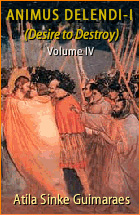 Volume IV |
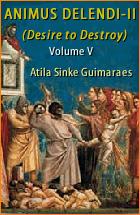 Volume V |
 Volume VI |
 Volume VII |
 Volume VIII |
 Volume IX |
 Volume X |
 Volume XI |
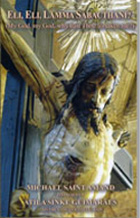 Special Edition |



